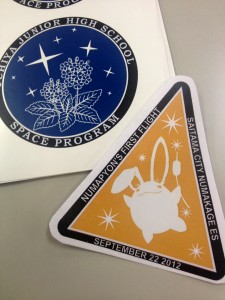Learner Autonomy? Clap clap Nice! Whooo Matt Shannon 
There’s a reason I love my job. It’s because I see people award themselves every day; it’s because I see communities built and strengthened every day; it’s because I send packages full of science experiments on their way to the edge of space… sometimes. I’m talking about Learner Autonomy, about learners enabling themselves to be the people they want to be, making connections within themselves and the world around them. Learner autonomy is vitally important to me. Without it, I can’t think of a more boring job than “teaching”, and there are a few lessons I’d love to share with you.
First, do your learners know how they feel about their efforts? Have they been given a chance to reflect on their activities; to make the connections between themselves and their performance, rather than their performance and the goal? Make it happen. Grab it; embrace it. Consider this remark: “at first I didn’t understand, so I couldn’t do the activity correctly, but now I understand. I want to try it again.” Now imagine that same student without the opportunity to reflect and to clear their chest: how damaging would that same performance be to their relationship with the subject? In these opportunities students are enabled to support themselves; an encouragement and assessment fundamentally different from what teachers can give, but through negligence can definitely take away.
Give them a chance to write. “I talked so much. I wrote so much. I feel great.” Watch how it changes the class; watch how it changes you. Provide the opportunity for reflection and self-assessment. If you’re as lucky as I am and have a chance to read student’s work, it will truly inform you as to the effectiveness of your class, and where further strength and opportunity lay. Don’t miss it.
Next, have you noticed there are more students than teachers in just about learning environment? That praise from someone, even if what’s been accomplished is not technically perfect in its execution, is still just as valuable? I challenge of all of you to make the most out of the goldmine that is peer feedback and support.
Every situation is different, but I have found a few consistent elements when I asked myself “what worked in this lesson? What worked this year?” Check it out:
Visuals help tremendously. If you put up 40 student papers on a wall, and ask students to respond to three – oh boy, good luck. Try the same with even the most basic cover sheet – the logo of the company you wish to apply to in the case of the resume-writing, or a picture or three in the case of a journal entry, a newspaper cut-out for any sort of review or commentary – and watch things take off.
“[clap clap], NICE!” A fifth grade teacher I work with solved the problem of getting the whole class involved in praise. Every time we hear a cool comment, [clap clap], NICE! is to be heard a second later. (In my class, we occasionally WHOOO like cheerleaders. That’s ok.) In your own environment, see if you can find a way to involve the whole class, and back up your supporters as they back up the supported. It doesn’t necessarily have to be loud.
Group feedback. As discussed earlier, time set aside for reflection and feedback allows us to re-assess our performance, and in the process make something special out of it. It’s fantastic in pair and group situations as well, and leads to some discussion skills I can think of no better way to develop.
Make it consistent. If you ask students for peer-feedback in one session, it might be difficult – they probably weren’t looking out for each other as much as they could have. Keep it up, and they’ll be listening and accounting each other at no additional cost to you.
Give examples early and often. Just as I am more excited about a picture of a cake than looking at its recipe, knowing what an end product should look or feel like allows students to reorganize and make self-corrections and share each other’s strength – the whole point of groups in the first place.
Lastly, if you want students to look beyond the classroom, well, give them that experience! It may take some thinking, but there are ways to give them external confirmations of success. I’m so proud to say that I’ve had students recently send science experiments to total strangers half a world away as part of the PongSat program – look for photos on the blog with a triangular orange sticker, or a blue circle, that’s us! – and even though it was barely related to English I’ve got everyone talking about what they can do next.
Be something between a coach and a librarian, and help them make the connections to where they want to be. Have them write letters to actual people or companies. Find some buddies on Skype who are willing to be interviewed. Enter competitions. Go to the library together; go anywhere together. Find the ways for them to engage themselves with the world beyond the classroom, now. That is the point, isn’t it?
I hope in all this talk about reflections and success, be it personal, peer, or in the world, that you have found something of value. It was a pleasure writing this.
WHOOO!



Very nice article. Teacher directly participates the process of students’ becoming autonomous learners. Going to libraries together with them and encouraging them to join competitions is a nice idea. Teachers’ have students write feedback about classes is the brilliant idea for teachers and the students both.